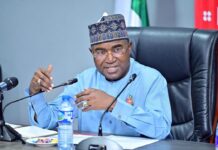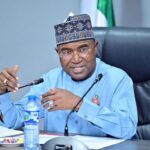The World Bank on Friday approved debt relief for the poor and vulnerable member-countries of its International Development Agency (IDA) as the coronavirus pandemic continues to take a devastating toll on the global economy.
The World Bank Group President, David Malpass, announced the debt relief during the Spring 2020 Plenary Development Committee virtual meeting in Washington DC.
He said the programme was pursued under its Debt Initiative, saying badly affected countries have already been asked to submit their requests.
“We (World Bank) will expect IDA governments to seek comparable terms from their commercial creditors moratorium and strongly welcome the G20 announcement on Wednesday that official bilateral creditors will allow the IDA countries that request forbearance to suspend repayment starting on May 1,” Mr Malpass said.
He said the World Bank would be “providing massively scaled up and frontloaded positive net transfers to IDA countries on highly concessional terms.”
“Debt relief is a powerful, fast-acting measure that can bring real benefits to the people in poor countries. It’s important that beneficiary countries use the additional resources to respond to COVID-19 and fully disclose their public sector financial commitments,” the World Bank President said.
It is not clear if Nigeria has submitted or plans to submit her request for the facility. When the Minister of Finance, Budget and National Planning, Zainab Ahmed was contacted for clarification on the country’s latest debt status, she did not respond to calls to her telephone as well as text messages sent to her.
But, during the launch of the federal government’s fiscal stimulus measures in response to the COVID-19 pandemic, the minister said the country had requested for a $2.5 billion credit facility from the World Bank.
Nigeria and Pakistan referred to as “blend” countries are among the 76 IDA-member countries currently eligible to receive IDA resources based on their per capita income levels as well as creditworthiness for the International Bank for Reconstruction and Development (IBRD) borrowing.
To qualify for IDA support is dependent on the requesting country’s relative poverty level as defined by its average gross national income (GNI) per capita put at about $1,175 annually.
The GNI per capita represents the dollar value of a country’s final income in a year, divided by its population.
Meanwhile, the World Bank President also announced plans to deploy about $160 billion over the next 15 months to help countries protect the poor and vulnerable, support businesses, and bolster economic recovery.
He said given the unprecedented challenges COVID-19 poses, the bank expects to work closely with client countries to ensure that their debt burdens do not overwhelm their ability to reduce poverty or provide essential government functions.
He said IDA would provide $50 billion of that total on grant and highly concessional credit terms.
The programme is to help protect the poorest and most vulnerable households and support businesses and save jobs, which IFC and MIGA are working with private sector clients to do by supporting trade and working capital lines.
Also, it will help developing countries implement emergency health operations and strengthen economic resilience.
From July 1, 2020, he said, all IDA countries would be subject to the Group’s Sustainable Development Finance Policy (SDFP) that would replace the Non-Concessional Borrowing Policy (NCBP).
The SDFP would provide incentives for countries to borrow sustainably and promote coordination between IDA and other creditors in support of countries’ efforts.
“We face a very different and more challenging environment today. This is an unprecedented crisis, with devastating health, economic and social effects felt around the world.
“While the tragic impacts of this pandemic are being felt globally, this crisis will likely hit the poorest and most vulnerable countries – and people – the hardest.
“Beyond the health impacts from the COVID-19 pandemic, we are expecting a major global recession.
Our estimates suggest a much deeper global downturn than the Great Recession, given the declines in production, investment, employment and trade,” Mr Malpass said.
Describe the global economic outlook as grim, he said although the group has begun an intervention under its “COVID-19 Emergency Response”, it was clear it won’t be enough.
As of Friday, he said the World Bank has financed, and staff are implementing, COVID-19 programmes in 64 developing countries, and targets 100 countries by the end of April.
With existing resources, fully leveraged and front loaded, he said the group would be able to provide $160 billion of financing over the next 15 months.



















